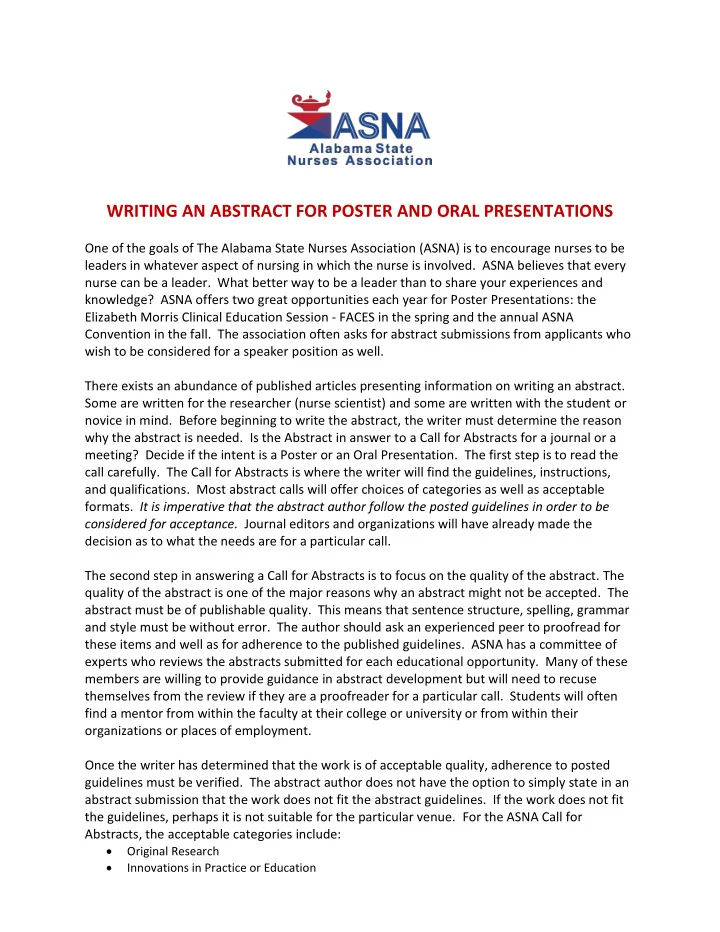

WRITING AN ABSTRACT FOR POSTER AND ORAL PRESENTATIONS One of the goals of The Alabama State Nurses Association (ASNA) is to encourage nurses to be leaders in whatever aspect of nursing in which the nurse is involved. ASNA believes that every nurse can be a leader. What better way to be a leader than to share your experiences and knowledge? ASNA offers two great opportunities each year for Poster Presentations: the Elizabeth Morris Clinical Education Session - FACES in the spring and the annual ASNA Convention in the fall. The association often asks for abstract submissions from applicants who wish to be considered for a speaker position as well. There exists an abundance of published articles presenting information on writing an abstract. Some are written for the researcher (nurse scientist) and some are written with the student or novice in mind. Before beginning to write the abstract, the writer must determine the reason why the abstract is needed. Is the Abstract in answer to a Call for Abstracts for a journal or a meeting? Decide if the intent is a Poster or an Oral Presentation. The first step is to read the call carefully. The Call for Abstracts is where the writer will find the guidelines, instructions, and qualifications. Most abstract calls will offer choices of categories as well as acceptable formats. It is imperative that the abstract author follow the posted guidelines in order to be considered for acceptance. Journal editors and organizations will have already made the decision as to what the needs are for a particular call. The second step in answering a Call for Abstracts is to focus on the quality of the abstract. The quality of the abstract is one of the major reasons why an abstract might not be accepted. The abstract must be of publishable quality. This means that sentence structure, spelling, grammar and style must be without error. The author should ask an experienced peer to proofread for these items and well as for adherence to the published guidelines. ASNA has a committee of experts who reviews the abstracts submitted for each educational opportunity. Many of these members are willing to provide guidance in abstract development but will need to recuse themselves from the review if they are a proofreader for a particular call. Students will often find a mentor from within the faculty at their college or university or from within their organizations or places of employment. Once the writer has determined that the work is of acceptable quality, adherence to posted guidelines must be verified. The abstract author does not have the option to simply state in an abstract submission that the work does not fit the abstract guidelines. If the work does not fit the guidelines, perhaps it is not suitable for the particular venue. For the ASNA Call for Abstracts, the acceptable categories include: • Original Research • Innovations in Practice or Education
• Patient Safety • Quality Improvement • Benchmarking Initiatives • Case Studies Abstracts should be no longer than 500 words, in 12-point font, with up to 2 additional bibliography pages. Although ASNA requires bibliography pages, an abstract should not have citations within the body. For Original Research, the content should be presented in the form of a structured abstract: • Purpose • Subjects • Design • Methods • Results • Limitations • Implications for Practice A similar format will be used for the remaining options or categories. For example, the format for a Case Study Abstract might, more appropriately, include the following: • Introduction • Case Presentation: o History of Present Illness o Hospital Course o Family History o Social History o Labs, Images, Studies • Discussion Many abstracts received by the ASNA Research Committee are technically narratives related to a particular topic with a main focus on a review of the literature (ROL). A ROL is not a research method and is typically not an accepted category for oral presentation for a meeting. Most attendees are interested in what is currently being discussed or what the “Hot Topics” are in nursing. Anyone who is interested in scientific research will do a ROL as part of the information development process. Therefore, ASNA asks that a paper or poster based solely on a ROL not be submitted as such. If the abstract author encounters a unique or interesting case study, a ROL would be an appropriate piece of the background for the presentation but would not be presented as a ROL rather as a Case Study. Innovations in Practice or Education, Quality Improvements and Benchmarking Initiatives might be developed by the author(s) or discovered during a ROL because of a personal interest. The Abstract would be written as a narrative with a format that includes: • Introduction • Background • ROL • Implications for Practice The category of Patient Safety might include a number of topics such as Safe Staffing, Prevention of Falls, Medication Errors and many others. The appropriate format would be very similar to that of Innovations in Practice or Education. In some case, a Case Study might be included. Although there is
room for some variance in format, it is imperative that the general guidelines be followed. If potential Abstract Submitters have questions, please contact the authors: Mary Beth Bodin, DNP, CRNP, NNP-BC Neonatal Consultant and Author sbodin2006@comcast.net Or Gretchen S. McDaniel, PhD, RN, CNE Graduate Associate Dean and Professor gsmcdani@samford.edu Recommendations for Further Reading: G. Wood & R. Morrison (2011). Writing Abstracts and Developing Poster for National Meetings. Journal of Palliative Medicine, 14(3). pp. 353-359. DOI: 10.1089/jpm.2010.0171 Resources for writing an abstract American College of Physicians (ACP) guidelines: https://www.acponline.org/membership/residents/competitions- awards/abstracts/preparing/writing http://www.writeawriting.com/academic-writing/abstract-literature-review/
Recommend
More recommend